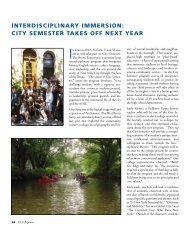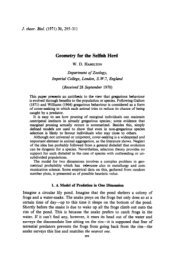Chapter 6 - Ethical Culture Fieldston School
Chapter 6 - Ethical Culture Fieldston School
Chapter 6 - Ethical Culture Fieldston School
Create successful ePaper yourself
Turn your PDF publications into a flip-book with our unique Google optimized e-Paper software.
“Mr. Sinatra Gets Rejected”<br />
The point of this little tableau was to illustrate the fast pace of life in The<br />
New Era. What may first strike a reader now, however, is how quaint it all seems<br />
– the virtual bragging about technology that is now commonplace, if not obsolete<br />
(alarm clocks, skyscrapers, typewriters); the dated slang and references<br />
(“hokum,” “wuxtry,” movie star Clara Bow); behavior that was once racy but is<br />
now regarded as distasteful, if not unacceptable (cigarette smoking, alcohol<br />
consumption, leering at women). Moreover, this sketch was not as fully<br />
representative as it was clearly meant to be; a “typical citizen,” if there is any<br />
such person, did not necessarily live in a city, ride a subway, work in a<br />
skyscraper, or even have a lunch hour. Ironically, perhaps, what it most<br />
accurately depicts is the provincialism inherent in this writer’s assumption that<br />
he can render a “typical” American experience.<br />
Such limits notwithstanding, there nevertheless does seem to be much in<br />
this description that not only rings true of what many observers at the time and<br />
since have observed of the twenties, but also in the way John Smith’s life<br />
resembles that of, say, his granddaughter Juanita Smith. The essential shape of<br />
the day shows striking similarity to ones experienced today: a morning routine<br />
followed by a rush‐hour commute to work, with a subsequent workday<br />
punctuated by daily rituals that culminate in a trip home and “an illusion of<br />
freedom.” One can grasp the fundamental continuity of John and Juanita’s time<br />
by imagining alternatives on either side of the temporal divide: these are not<br />
people who begin their day by milking cows or drawing water from a well, nor<br />
do they put food on the table by telecommuting from computer terminals in their<br />
homes or attached to their clothing.<br />
Perhaps more importantly, John’s and Juanita’s lives are also paralleled in<br />
the extraordinary range of the mass media in suffusing their days. Driving home<br />
American History for Cynical Beginners<br />
11
















